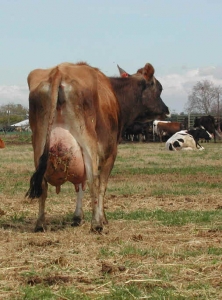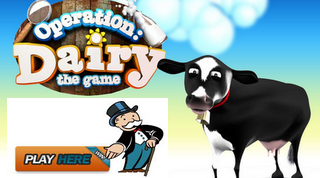Feeds for dairy cows
Cows on Diet Less Farty?

Methane comes out of the other end of gassy cows as well. And while methane is much less common in the atmosphere than carbon dioxide, it has 20-times the heat-trapping ability. The United Nations has called livestock one of the most serious near-term threats to the global climate, and the EPA estimates that close to 28 percent of all methane emissions related to human activity come from the guts of domestic cattle, sheep, and goats.
But in France, Ireland, and Vermont, researchers have found that by changing cows’ diets to include omega- 3 fatty acids—either in the form of fish oils or in plants such as alfalfa and flaxseed—bovine flatulence and belching is significantly reduced. In March, the University College in Dublin reported that by including two-percent fish oil in cattle feed, overall flatulence was reduced, and the methane released by three cows on the diet was reduced by 21 percent.
Dr. Lorraine Lillis, one of the researchers, said; “The fish oil affects the methane-producing bacteria in the rumen part of the cow’s gut, leading to reduced emissions. Understanding which microbial species are particularly influenced by changes in diet and relating them to methane production could bring about a more targeted approach to reducing methane emissions in animals.”
 In Vermont, dairy cows at 15 farms have had their grain feed adjusted to include “spring” grass like alfalfa and flaxseed that, unlike the corn and soy fed to mass-produced cattle, mimic the natural grasses that cows evolved to eat. The program, initiated by organic yogurt manufacturer, Stonefield Farms, has resulted not only in less methane emissions, but also healthier cows with shinier coats, and literally, sweeter breath.
In Vermont, dairy cows at 15 farms have had their grain feed adjusted to include “spring” grass like alfalfa and flaxseed that, unlike the corn and soy fed to mass-produced cattle, mimic the natural grasses that cows evolved to eat. The program, initiated by organic yogurt manufacturer, Stonefield Farms, has resulted not only in less methane emissions, but also healthier cows with shinier coats, and literally, sweeter breath.
Groupe Danone, French makers of Dannon yogurt and Evian spring water, bought a majority stake in Stonyfield Farms in 2003. Since then, scientists have been working to discover why their cows were healthier and produced more milk in the spring. They determined that the omega-3 fatty acids abundant in spring grasses might help cows’ digestive tracts operate more smoothly. The new feed, rich in omega-3 fatty acids, is already used at 600 farms in France. Valorex ASA, a French Company that makes the feed additives, is working with Stonyfield Farm to introduce the program to the U.S. Methane-reduction results in France are down by about 30 percent, probably because the feed is distributed not only to organic farms, but to big, industrial farms as well.
It’s hard to argue against healthy cows with sweet breath and fewer toxic farts as a great green initiative. Not to mention their milk tastes better, too!






















